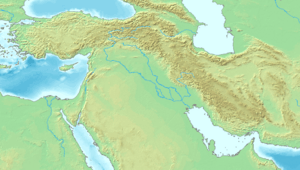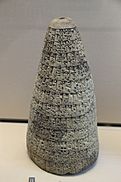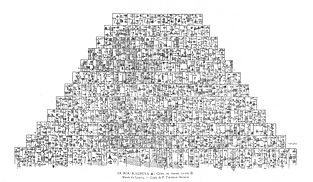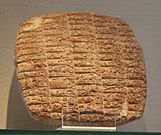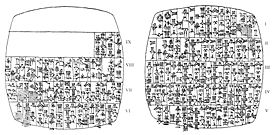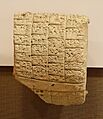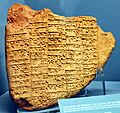Urukagina facts for kids
Quick facts for kids Urukagina |
|
|---|---|
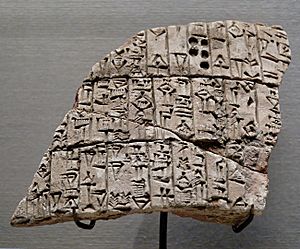
A piece of writing about Urukagina. It says he built canals and temples. Musée du Louvre
|
|
| Ensí of Lagash, Lugal | |
| Reign | 24th century BC |
| Predecessor | Lugalanda |
| Successor | Lugal-zage-si |
| Dynasty | 1st Dynasty of Lagash |
| Religion | Sumerian religion |
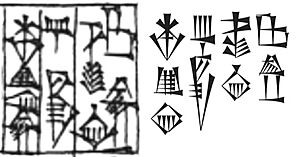
Urukagina (also spelled Uru-inim-gina or Iri-ka-gina) was an important ruler in ancient Mesopotamia. He was the king of the city-states of Lagash and Girsu around 2400 BC. He was the last king of the First Dynasty of Lagash.
Urukagina became king after his predecessor, Lugalanda, who was seen as unfair. Urukagina said he was chosen by the gods to rule. He is famous for trying to make things better for his people. He created new rules to fight against unfairness and corruption. Some people even say his rules were the first set of laws in history!
His rules helped many people. For example, he made sure that widows (women whose husbands had died) and orphans (children without parents) did not have to pay taxes. He also made the city pay for funeral costs, including special food and drinks for the dead. Another important rule was that rich people had to use silver when buying things from poor people. If a poor person did not want to sell, a powerful person could not force them to.
Urukagina also fought in wars. He lost a border conflict with the city of Uruk. In his seventh year as king, another ruler named Lugal-Zage-Si from the city of Umma took over Uruk. Lugal-Zage-Si then took most of Lagash's land. The fall of Lagash was written about in a sad poem. This poem said that Lugal-Zage-Si did wrong, but Urukagina was innocent. Later, Lugal-Zage-Si was defeated by Sargon of Akkad.
Contents
What Were Urukagina's Reforms?
Urukagina's new rules are often called the first example of government trying to create more freedom and fairness. He wanted to limit the power of priests and rich landowners. He also made rules against high interest rates on loans, unfair controls, hunger, theft, murder, and taking people's property.
He famously said, "The widow and the orphan were no longer at the mercy of the powerful man." The word for "freedom" in Sumerian, "ama-gi", appeared for the first time in history in his writings.
Even with these changes, it seems that royal women gained more power during his rule. Urukagina made the royal "Household of Women" much larger, from about 50 people to 1500. He renamed it the "Household of goddess Bau" and gave it a lot of land that used to belong to priests. He put his wife, Shasha (or Shagshag), in charge of it. In his second year as king, Shasha even led the big funeral for the previous queen, Baranamtarra, who was also a very important person.
Examples of Urukagina's Rules
Here are some examples of the rules from Urukagina's reform document:
- No one could serve as officers from the border of Ningirsu to the sea.
- For a dead person being buried, they would get 3 jugs of beer and 80 loaves of bread. The undertaker would take one bed and one lead goat. Other people would take 3 ban (about 18 liters) of barley.
- When someone was brought to the reeds of Enki, they would get 4 jugs of beer and 420 loaves of bread. The undertaker would take one barig (about 36 liters) of barley. Other people would take 3 ban (about 18 liters) of barley. A special priestess would take a woman's headband and one sila (about 1 liter) of princely perfume.
- The blind person who stood in a certain place would get one loaf of bread for eating, 5 loaves at midnight, one loaf at midday, and 6 loaves in the evening.
- A person acting as a sagbur priest, king, or god would receive 60 loaves of bread, 1 mud vessel of beer, and 3 ban of barley.
Praise for King Urukagina
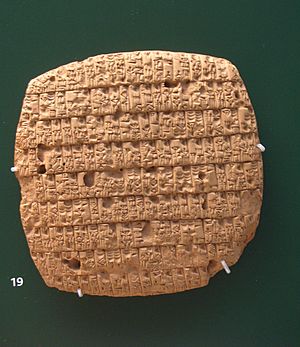
Ancient Sumerian people sometimes wrote special poems to praise their kings. These poems show what people thought was important for a good ruler to do. Even if kings didn't always live up to the praise, the poems show what they wanted to be remembered for. The poems about Urukagina praise him as a social reformer. They say he got rid of many unfair practices that had become common in Lagash.
Here are some parts from a praise poem about Urukagina:
- For a very long time, boatmen, livestock officials, and fisheries inspectors would take boats, donkeys, sheep, and fish for themselves. Shepherds had to pay silver taxes on their white sheep. Other officials also paid taxes on young lambs. These were the old ways!
- When the god Ningirsu chose Urukagina to be king of Lagash, Urukagina changed these old customs. He followed the commands that Ningirsu, his master, had given him.
- He stopped the head boatman from controlling the boats. He stopped the livestock official from controlling donkeys and sheep. He stopped the fisheries inspector from taking things.
- He stopped the silo supervisor from controlling grain taxes. He stopped officials from collecting silver taxes on white sheep and young lambs. He also stopped officials from taking duties from temple administrators for the palace.
- The administrators no longer stole fruit from the gardens of poor people. If a rich donkey was born to a poor farmer (a shublugal), and a foreman wanted to buy it, the foreman could not hit the farmer if he didn't want to sell or wanted a higher price.
- If a rich person's house was next to a poor farmer's house, and the rich person wanted to buy it, the rich person could not hit the farmer if he didn't want to sell or wanted a higher price.
- Urukagina canceled debts for families in Lagash who were forced to work because of grain taxes, barley payments, theft, or murder.
- Urukagina promised the god Ningirsu that he would never let powerful people control or harm the helpless and the widows.
The Fall of Lagash
Urukagina fought in several wars. One important conflict was a border dispute with the city of Uruk, which he lost. In the seventh year of Urukagina's rule, Uruk came under the control of Lugal-Zage-Si, the governor of Umma. Lugal-Zage-Si then took over most of Lagash's land. He created the first kingdom that included all of Sumer.
The destruction of Lagash was described in a sad poem, which is one of the earliest examples of this type of writing in Sumerian history. The poem said:
"the man of Umma (Lugalzagesi) ... did wrong against Ningirsu. ... Urukagina, king of Girsu, did nothing wrong. But as for Lugal-Zage-Si, governor of Umma, may his goddess Nisaba make him carry his sin upon his neck."
Soon after, Lugal-Zage-Si himself was defeated. His kingdom was taken over by Sargon of Akkad.
Images for kids
-
Reform cone of Urukagina
Louvre Museum
AO 3149
See also
 In Spanish: Urukagina para niños
In Spanish: Urukagina para niños
- List of ancient legal codes
 | John T. Biggers |
 | Thomas Blackshear |
 | Mark Bradford |
 | Beverly Buchanan |


